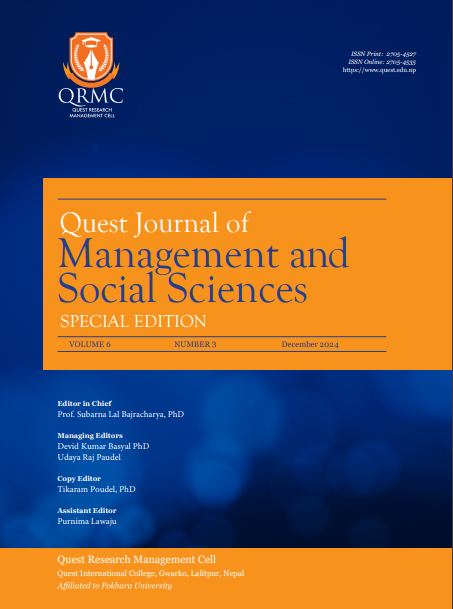Climate Change and its Adaptation in Agricultural Sector
DOI:
https://doi.org/10.3126/qjmss.v6i3.72214Keywords:
Climate change, Agriculture sector, Time series, ARDL modelAbstract
Background: Climate change has emerged as a significant threat to global agricultural productivity, affecting food security and economic stability, particularly in agrarian economies. The agricultural sector is highly vulnerable to climate variations, including changes in temperature, precipitation patterns, and the frequency of extreme weather events. Understanding how these climatic factors influence agricultural output is crucial for developing effective adaptation strategies.
Objective: The study assesses the relationship between climate change on agricultural productivity and to identify effective adaptation strategies that can mitigate the adverse effects of changing climatic conditions on agriculture.
Methods: This study utilizes a variety of secondary data sources. In this study quantitative modeling of climate change and its adaptation in agricultural sector is conducted by considering the time period of 32 years from 1991 to 2022 using the autoregressive distributed lag approach (ARDL) followed by TY Non-Granger Causality Test.
Results: The analysis shows that annual average maximum temperature boosts agricultural productivity in the long run, supported by positive irrigation effects. Conversely, minimum temperature negatively impacts crop growth over time. CO2 emissions and precipitation are insignificant in the long run but have short-term effects. Surprisingly, chemical fertilizers reduce productivity, while improved seeds only enhance it in the short term. Irrigation has a small positive long-term effect.
Conclusion: The study reveals that the annual average maximum temperature boosts agricultural productivity in the long run due to farmers' adaptation strategies, while minimum temperature negatively impacts crop growth. CO2 emissions and precipitation show no significant long-term effects, though they have short-term impacts. Chemical fertilizers reduce productivity over time, likely due to soil degradation, while irrigation has a marginally positive long-term effect. Improved seeds enhance short-term productivity but show no significant long-term impact
Implication: The study highlights the need for sustainable practices and holistic to address both immediate and long-term agricultural challenges posed by climate change approaches for boosting agricultural output
Keywords: Climate change, Agriculture sector, Time series, ARDL model
JEL Classification: C32, Q1, Q5
Downloads
Downloads
Published
How to Cite
Issue
Section
License
Copyright (c) 2024 Quest Journal of Management and Social Sciences

This work is licensed under a Creative Commons Attribution-NonCommercial-NoDerivatives 4.0 International License.
This license enables reusers to copy and distribute the material in any medium or format in unadapted form only, for noncommercial purposes only, and only so long as attribution is given to the creator.




